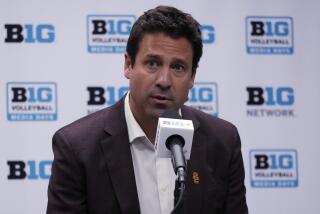Sharp Scates : UCLA Volleyball Coach Shapes Teams His Way, Has 16 Titles and Share of Record to Show for It
Some time over the next few weeks, an almost annual UCLA volleyball ritual will take place in the office of Coach Al Scates.
Two seniors, Stein Metzger and Brian Wells, will go up to the second floor in the J.D. Morgan Center and walk to a small area closed off by walls covered with awards and photos of former great Bruin players and teams.
The seniors will discuss with Scates the design of UCLAâs latest NCAA championship ring, which they won Saturday night with a dramatic five-game victory over Hawaii at Pauley Pavilion.
The ringâs design not only will honor this yearâs team but it will also pay tribute to Scates and the Bruinsâ rich volleyball tradition. It will have 16 diamonds to represent each year UCLA has won an NCAA national title under Scates, who is tied with Houston golf Coach Dave Williams for most titles won in a single sport.
Not bad for someone who began his coaching career working for free 34 years ago.
âBack in those days, UCLAâs athletic department was in a couple of temporary trailers on Westwood [Boulevard],â said Scates, who has an 894-138 record and will turn 57 next month.
âI went in there to talk about the coaching job to Wilbur Johns, who was the athletic director then, and I told him that I wanted to remain an amateur so I could
keep playing volleyball and I didnât want to get paid. When he heard that, he jumped out of his chair to shake my hand and told me, âAl, youâre the kind of man weâre looking for. Youâre hired.â â
If there ever was a person who has nurtured a college program from its infancy to adulthood, it is Scates--a former All-American player at UCLA and U.S. national team member.
âWhen you talk of UCLA volleyball, youâre talking about Al Scates,â said Penn State Coach Mark Pavlik, whose team is 0-3 against UCLA, including a loss to the Bruins in the 1995 championship match.
When Scates took over as coach in 1962, volleyball was not a sanctioned NCAA sport and money was scarce. His teams would play one or two matches a week and it wasnât uncommon for Scates to pile the entire eight-man team into his 1947 Mercury Woody station wagon, which he bought for $25.
âWe didnât have money for food, so it always was a big treat for us to go to a tournament that had boxes of oranges,â said Scates, who has taught full time at a Beverly Hills elementary school for more than 30 years.
If not for the generosity of basketball Coach John Wooden, the volleyball team wouldnât have had any uniforms either.
âBudget wise, we didnât have money [for volleyball uniforms], so when we got new uniforms they took our old ones,â said Wooden, who watched UCLA volleyball teams play in old basketball garb until the early 1970s. âBut, if the [volleyball] team had been losing, I donât know if I would have let them.â
Besides the 16 NCAA titles, Scatesâ teams won two U.S. Volleyball Assn. national titles his first seven years. Volleyball wasnât recognized as an official sport by the NCAA until 1970.
In 1964, Scates almost stepped down after he allowed basketball standout Keith Erickson to play in a key volleyball game.
âCoach Wooden and [then] Athletic Director J.D. Morgan didnât want Erickson to play in fear that he would get injured,â Scates said. âBut he showed up one day with his basketball uniform and helped us win a match.â
A guilty Scates returned to school the next day and handed a resignation letter to Morgan because he felt that he had betrayed Wooden and the school. The request was never granted.
After volleyball became an official sport in 1970, UCLA won the first three national titles. Scatesâ versatile teams featured the talents of tournament most valuable players Dane Holzman, Kirk Kilgour and Dick Irvin.
The Bruins went on to win championships in 1975 and 1976. Then in 1979, a Sinjin Smith-led team became the first to finish undefeated at 31-0 with a four-game victory over USC in the final.
During this time, Scates developed a practice area called the âBlue Curtain,â where nonstarters practiced until they earned the right to move to the varsity court.
âI spent a whole year there and I never wanted to go back,â said John Speraw, a starter on last yearâs championship team. âItâs really tough practicing there, but I do have fond memories from that year. Thatâs where you learn.â
This year, UCLA benefited from the play of a former âBlue Curtainâ regular when Trong Nguyen returned from spending a semester studying for a medical school entrance exam to help the Bruins beat Cal State Northridge and UC Santa Barbara in the Mountain Pacific Sports Federation tournament finals.
âIâll practice only 12 players on the varsity court and if you are not on that court, it means that Iâm not looking at you,â Scates said about the blue curtains that separate the courts. âOn the other court, my assistants watch and they tell me when they think a player is ready to practice on the main court. Sometimes players go down, sometimes they go up. I donât like to cut anyone.â
Scates treats all of his players the same and keeps his distance from them in order for him to be objective on his decisions on who should play.
âWhen I first came here, I was very hard-headed,â said Metzger, the American Volleyball Coaches Assn. co-player of the year. âI was the type of player he needed to break. At first, I didnât approve of his tactics, but I learned to love Al and the way he does things. I guess Iâve been broken or molded now, because everything he does I think is fabulous.â
Itâs not as if Scatesâ players think that he is unreachable when they meet him.
âItâs just that he has this aura that seems to make him bigger than life when you meet him,â said Brain Rofer, a former UCLA player and now assistant coach. âHeâs really easy to talk to. Itâs just that he keeps his distance. Your relationship with him changes once you stop playing for him.â
Scatesâ records are remarkable. To go along with his national titles, he has won 20 conference championships and coached 71 All-Americans, 29 U.S. national team members, 13 Olympians and seven players of the year.
This year, Scates may have done his best job of coaching.
With an inexperienced team that was missing four players who had graduated from last yearâs title team, Scates put together a squad that played second fiddle to Hawaii all season before rallying to defeat the Rainbows Saturday night.
âItâs always more satisfying when you win when you are not expected to and you have to struggle,â Scates said. âThis yearâs team had more than its share of injuries but was able to overcome them. It was great to see so many people play key roles.â
So what is Scatesâ secret?
âI try to recruit highly competitive players who have a history of winning and if they are on [a losing team], they look like they are winning,â he said. âThen, itâs a matter of peaking at the right time. Iâve learned how hard to work a team. Some coaches overwork their teams and some others under-work them. Iâve found the right combination of hard work and rest.â
Scates, who will be a consultant to the U.S. Olympic team in Atlanta, has no plans to retire. âIâll be doing this for a long time,â he said. âIâm still having fun.â
More to Read
Go beyond the scoreboard
Get the latest on L.A.'s teams in the daily Sports Report newsletter.
You may occasionally receive promotional content from the Los Angeles Times.






